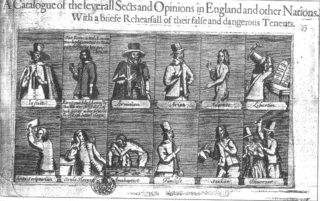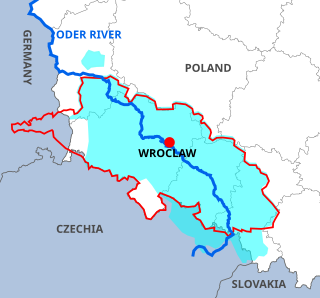
Anabaptism is a Christian movement which traces its origins to the Radical Reformation. The movement is generally seen as an offshoot of Protestantism, although this view has been challenged by some Anabaptists.

Moravia is a historical region in the Czech Republic and one of the historical Czech lands, together with Bohemia and Czech Silesia. The medieval and early modern Margraviate of Moravia was a crown land of the Lands of the Bohemian Crown, an imperial state of the Holy Roman Empire, later a crown land of the Austrian Empire and briefly also one of 17 former crown lands of the Cisleithanian part of the Austro-Hungarian Empire from 1867 to 1918. During the early 20th century, Moravia was one of the five lands of Czechoslovakia from 1918 to 1928; it was then merged with Czech Silesia, and eventually dissolved by abolition of the land system in 1949.

The Orthodox Church of the Czech Lands and Slovakia is a self-governing body of the Eastern Orthodox Church that territorially covers the countries of the Czech Republic and Slovakia. Archbishop Rastislav of Prešov was elected by the Extraordinary Synod held on January 11, 2014, as the new primate. On December 9, 2013, the Synod removed Archbishop Simeon of Olomouc and Brno from his position as Locum Tenens, and appointed Archbishop Rastislav in his place, an action against which Archbishop Simeon protested and which was deplored by Patriarch Bartholomew I of Constantinople.

JakobHutter, was a Tyrolean Anabaptist leader and founder of the Hutterites.

The Czech lands or the Bohemian lands are the three historical regions of Bohemia, Moravia, and Czech Silesia. Together the three have formed the Czech part of Czechoslovakia since 1918 and the Czech Republic since 1 January 1969, which became independent on 1 January 1993.

Kolín is a town in the Central Bohemian Region of the Czech Republic some 55 kilometres (34 mi) east from Prague, lying on the Elbe River.

English Dissenters or English Separatists were Protestant Christians who separated from the Church of England in the 16th, 17th and 18th centuries.

Silesians is a geographical term for the inhabitants of Silesia, a historical region in Central Europe divided by the current national boundaries of Poland, Germany and the Czech Republic.

Moravian Wallachia, is a mountainous region located in the easternmost part of Moravia in the Czech Republic, near the Slovak border, roughly centered on the cities Vsetín, Valašské Meziříčí and Rožnov pod Radhoštěm. The name Wallachia used to be applied to all the highlands of Moravia and the neighboring Silesia, although in the 19th century a smaller area came to be defined as ethno-cultural Moravian Wallachia. The traditional dialect represents a mixture of elements from the Czech and Slovak languages, and has a distinct lexicon of Romanian origin relating to the pastoral economy of the highlands. The name originated in the "Vlachs", an originally Romance-speaking community that migrated to Moravia.
Peter Riedemann is considered the second founder of the Hutterite brotherhood, a branch of Anabaptist Christianity. Riedemann was born in Hirschberg (Silesia) and died in Brodsko (Slovakia).

The Ausbund is the oldest Anabaptist hymnal and one of the oldest Christian song books in continuous use. It is used today by North American Amish congregations.
The Martyrs' Synod took place in Augsburg, Germany, from 20 to 24 August 1527. The purpose of this meeting, attended by about sixty representatives from different Anabaptist groups, was to come to agreement over the differences related to the central Anabaptist teachings among the Swiss and south German Anabaptists.

The Swiss Brethren are a branch of Anabaptism that started in Zürich, spread to nearby cities and towns, and then was exported to neighboring countries. Today's Swiss Mennonite Conference can be traced to the Swiss Brethren.

The First Czechoslovak Republic was the Czechoslovak state that existed from 1918 to 1938. The state was commonly called Czechoslovakia. It was composed of Bohemia, Moravia, Czech Silesia, Slovakia and Subcarpathian Ruthenia.
The history of Moravia, one of the Czech lands, is diverse and characterized by many periods of foreign governance.
Johannes Bünderlin was an Austrian Anabaptist. Bünderlin was a humanist Catholic priest who had been attracted to the Reformation in Moravia and was baptised by Johannes Denck. Bünderlin returned to Linz and preached there until forced to leave for Konstanz in 1529 at the invitation of Johannes Zwick, though Zwick soon considered that Bünderlin was too radical in his ideas and Bünderlin set out for Prussia.

The Margraviate of Moravia was one of the lands of the Bohemian Crown existing from 1182 to 1918. It was officially administrated by a margrave in cooperation with a provincial diet. It was variously a de facto independent state, and also subject to the Duchy, later the Kingdom of Bohemia. It comprised the region called Moravia within the modern Czech Republic.
Music of the Czech Republic comprises the musical traditions of that state or the historical entities of which it is compound, i.e. the Czech lands. Czech music also constitutes a substantial part of the music culture of its direct predecessor, Czechoslovakia.













